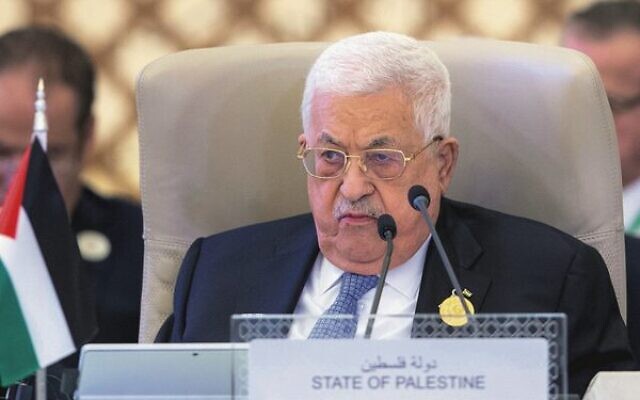Palestinians to raise demands with Saudis
Israeli Prime Minister Benjamin Netanyahu and his Foreign Minister Eli Cohen have both indicated that Israel is open to gestures to the Palestinians if a normalisation deal depended on it.

(Times of Israel) – A senior Palestinian delegation is set to travel to Saudi Arabia in the coming weeks to discuss the demands Riyadh is set to make of Israel as part of a potential normalisation agreement, according to a report.
Channel 13 news said that Israeli officials understand the Saudi requirements pertaining to Israeli concessions to Palestinians will be at the heart of the visit.
The network said security officials believe the Palestinian Authority has decided to change its tactics, electing to be involved in the process in an attempt to reap as many rewards as possible under any potential agreement, rather than boycott it as it did previous normalisation efforts.
The report added that Israeli leadership, previously hoping to reach an accord with the Saudis without significant steps toward the Palestinians, is beginning to internalise that this will not be so, and that the American and Saudi pressure on the matter is more than mere lip service.
Israeli Prime Minister Benjamin Netanyahu and his Foreign Minister Eli Cohen have both indicated that Israel is open to gestures to the Palestinians if a normalisation deal depended on it.
Netanyahu views normalisation with Riyadh as a key foreign policy goal and one that could cement his legacy. But the prospect of Israel’s current government approving any material concessions to Palestinians has been questioned, with Netanyahu’s far-right allies, upon which his coalition depends, highly unlikely to accept such measures. Some commentators have floated the possibility he may seek to ditch his hardline partners if a deal was on the table, in favour of a more centrist coalition with current opposition parties – though this also seems remote given the intense animosity between the sides.
Still, Netanyahu has insisted that the Palestinian issue will not be a hindrance.
“If there’s political will, there will be a political way to achieve normalisation and a formal peace between Israel and Saudi Arabia,” Netanyahu told Bloomberg.
Last Friday Axios reported that US officials stressed to Strategic Affairs Minister Ron Dermer during a recent visit that Israel will have to make far-reaching concessions to the Palestinians to secure a normalisation agreement.
Citing current and former US officials, the report said US Secretary of State Antony Blinken told Dermer that Israel is “misreading the situation” if it does not believe significant gestures to the Palestinians are necessary to assuage the Saudis, who he said will need to demonstrate tangible results to other Arab and Muslim countries if they are to make a deal with Israel.
The report further said that US National Security Adviser Jake Sullivan told Dermer that US President Joe Biden wants extensive support for a Saudi agreement from congressional Democrats, and Israeli gestures toward the Palestinians could help ensure this.
Meanwhile, Qatar’s prime minister said last Friday that his country does not “have a war with Israel”, but stressed it must reach a peace deal with the Palestinians.
Asked about the prospects of a Saudi–Israel normalisation deal, Mohammed bin Abdulrahman Al-Thani said Qatar believes the best way forward is 2001’s Saudi-led Arab Peace Initiative, which offered normalisation between Israel and the Arab world if Israel withdrew from the West Bank, Gaza and the Golan Heights and allowed the establishment of a Palestinian state with a capital in East Jerusalem.
“At the end of the day, we don’t have a war with Israel, the Israelis have an occupation over the Palestinians,” Al-Thani added.
“So any agreement [of an Arab nation] with the Israelis doesn’t represent peace, the peace [could be] represented only between them and the Palestinians.”
Qatar and Israel do not have diplomatic relations but last year cooperated to allow Israeli visitors to attend the World Cup soccer tournament.

comments